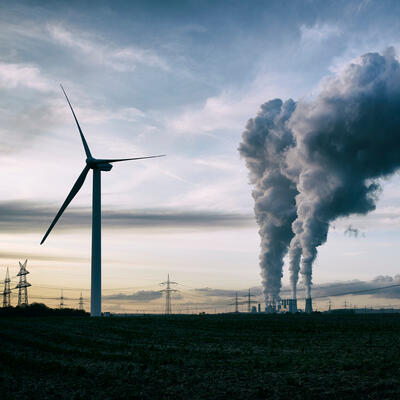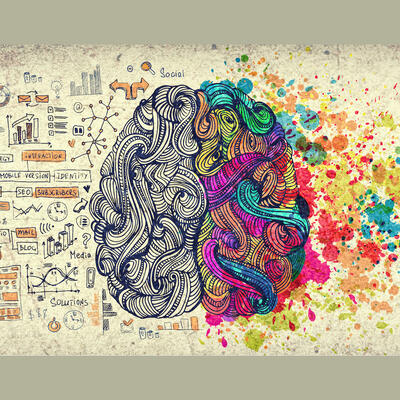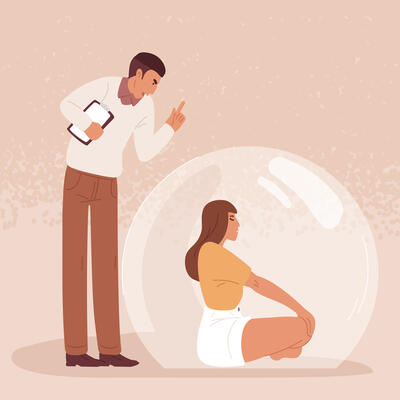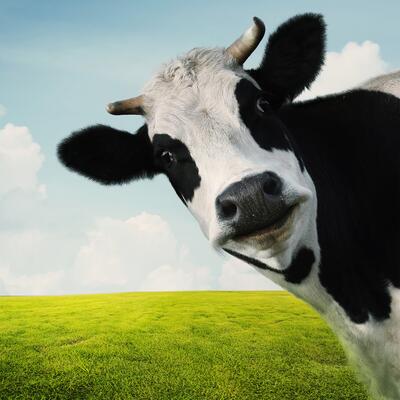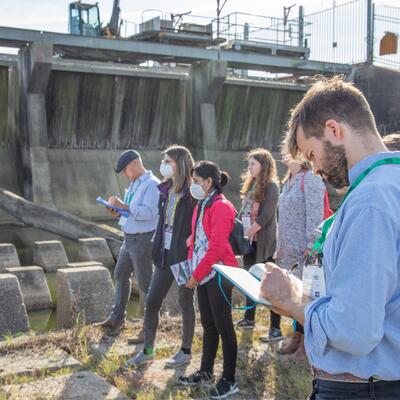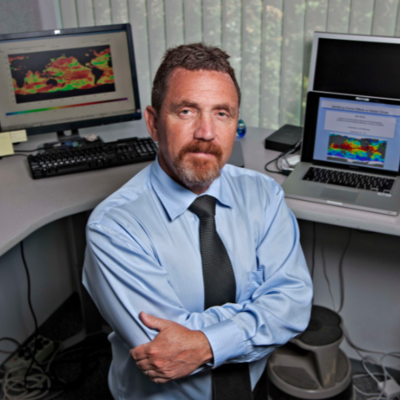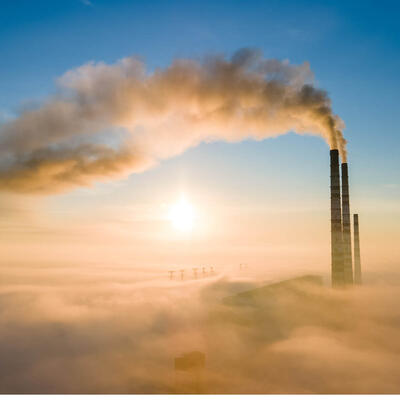
Our Greatest Unintended Experiment
Guests
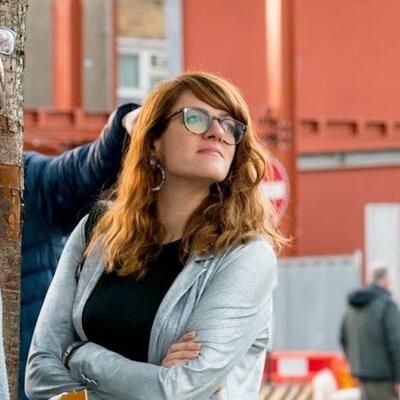
Alice Bell
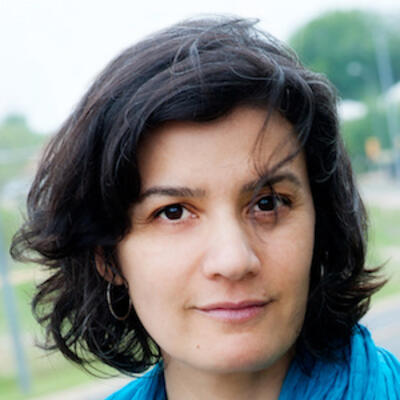
Meera Subramanian
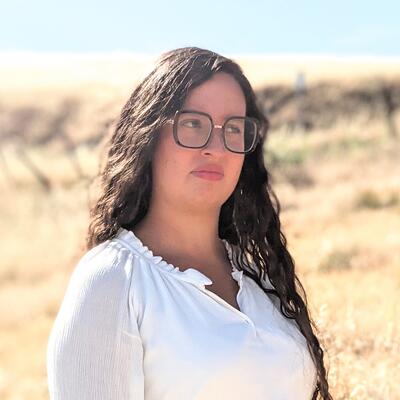
Katerina Gonzales
Summary
Our understanding of atmospheric and climate sciences has evolved significantly over the last century and a half, thanks to the work of many different people. Writer and London-based climate campaigner Alice Bell traces that history in her new book, Our Biggest Experiment: An Epic History of the Climate Crisis.
She opens with the story of Eunice Newton Foote, who conducted an experiment on her windowsill 160 years ago. By comparing the density and temperature of atmospheric gases in two glass cylinders, one filled with common air and the other with carbon dioxide, she discovered that CO2 grew hotter and took longer to cool down, laying the foundation for our understanding of what later came to be known as greenhouse gases. Many other scientists continued that field of discovery in the subsequent decades.
“When we look at the history of science it’s really tempting to try and have one character and to identify one eureka moment,” Bell says. “But science doesn’t work like that; science is a team sport.”
Still, the recognition of what we now call the climate crisis was slow to evolve.
“Up until really the second World War, when people did look at global warming and did look at the role that carbon dioxide could play, they generally thought it would be a good thing,” Bell says, partly influenced by the earlier history of cooler temperatures in the northern hemisphere.
Over time, scientists and the general public began to recognize the risks of too much CO2.
“I sometimes talk about the history of climate science, being less about a eureka moment and more about a series of “oh no” moments. And that “oh no” gets kind of deeper and more distressing as the late 20th century goes on.”
Bell says writing the book and her day job as a climate campaigner make her a realist, and sometimes a pessimist, but still not someone without hope.
“We already have enough warming that is causing devastation for many people around the world and we’re locked into a lot more, but that doesn’t mean it is all over. Because one of the good things about climate change is it isn’t a win or lose issue,” Bell says. “It happens bit by bit. And there is still so much to the world that we can save.”
At the tail end of 2021, a year of remarkable climate disruption, Netflix released “Don’t Look Up,” a climate change allegory. It follows two climate scientists desperately trying to get the U.S. government to respond to an Earth-destroying comet, and the way the media, society and politicians handle the threat. The movie was recently nominated for an Academy Award for Best Picture.
While many have pointed out that a comet is far from a perfect metaphor for climate disruption, it nevertheless sparked a lot of dialogue and reactions.
Climate scientist Katerina Gonzales says she resonated with the gender dynamics on display in the film, where the man scientist is lauded and the woman scientist, after getting emotional and angry on live TV about the impending disaster, is denigrated and ridiculed.
“I really resonated with the “yelling lady” phrase. So, I am Latina and I am pretty in touch with a lot of my emotions and also particularly anger when it comes to the climate crisis and other social issues,” Gonzales says. “So many times in these institutions that are male-dominated, specifically white male-dominated, that has a whole ideology of how women should be and behave and speak.”
Environmental journalist Meera Subramanian says she appreciated the movie lifting up our collective lack of listening, around climate or many other issues.
“Climate action takes all types and all efforts. Whether that's being out on front lines protesting to working on policy to working on technology to working on community building to being a scientist to being an artist being a filmmaker,” Subramanian says.
“We need people out there screaming. And then we also need other people being quieter and really taking into consideration who they're talking to and trying to change minds in other ways.”
Related Links:
Our Biggest Experiment: An Epic History of the Climate Crisis
Don’t Look Up
Full Transcript
Greg Dalton: This is Climate One. I’m Greg Dalton. Scientists have been studying the climate for 170 years, through different frames:
Alice Bell: Up until really the Second World War, when people did look at global warming and did look at the role that carbon dioxide could play, they generally thought it would be a good thing.
Greg Dalton: Over time scientists and the public began to recognize the risks of too much CO2:
Alice Bell: I sometimes talk about the history of climate science, being less about a eureka moment and more about a series of “oh no” moments. And that “oh no” gets kind of deeper and more distressing as the late 20th century goes on.
Greg Dalton: Today, climate action and communication can take many forms:
Meera Submaranian: We need people out there screaming. And then we also need other people being quieter and really taking into consideration who they're talking to and trying to like change minds in other ways.
Greg Dalton: The history of our unintended climate experiment. Up next on Climate One.
Greg Dalton: This is Climate One, I’m Greg Dalton. Our understanding of atmospheric and climate sciences has evolved over the last century and a half, thanks to the work of many different people. Today we explore some of that history with Alice Bell, a climate campaigner based in London and author of the book, Our Biggest Experiment: An Epic History of the Climate Crisis. She opens with the story of Eunice Newton Foote, who conducted an experiment on her windowsill 160 years ago. She compared the density and temperature of atmospheric gases in two glass cylinders. One was filled with common air, the other with carbon dioxide. She discovered that CO2 grew hotter and took longer to cool down. Bell talked with Climate One’s Ariana Brocious.
Ariana Brocious: The progress of science is slow and one person's ideas often build on those of others. You trace a lot of names in your book, including Eunice Foote, who way back in 1856 concluded that an atmospheric carbon dioxide would increase the planet’s temperature. Is she the person you would say definitively discovered the idea of greenhouse gases?
Alice Bell: It's not correct really to pin it on one person. One of the reasons there are so many characters in the book is there are so many people who contributed to our understanding of it. And when we look at the history of science it’s really tempting to try and have one character and to identify one eureka moment. But science doesn’t work like that, science is a team sport. And so, we could say, you know, she said that first before similar things that were said by other people later. I think we should celebrate her more than she has been celebrated because for so many years she was forgotten. But I think over-celebrate her is actually to do a disservice to so many other people who have work, you know, continue to work on climate change science and have worked through centuries. The people that she was drawing on, the other people who came after her. And the other thing I think that’s really important about the story of Eunice Foote was that she was forgotten. So, although that’s one of the reasons why we want to celebrate her today to kind of make up for all of those years where everyone forgot about her, science works by people remembering, you know, it works by people drawing on other people's ideas. And, you know, John Tyndall rightly or wrongly that people remembered and whose work people drew on. He had advantages that she didn't have. He was a man, he had a job in science, but he also had a lot of disadvantages. And one of the reasons he was remembered was that he was incredibly good at networking and he was very good at sharing his science and writing popular books, doing presentations, talking to people inside and outside of science. And that is part of the job of scientists so it’s a part of doing science. It isn’t just having a eureka moment like Eunice Foote had on her windowsill doing the science on her own.
Ariana Brocious: You describe the evolving science of humans understanding the atmosphere and the role of carbon dioxide in warming. But you write that for a long time this wasn’t concerning to them. Why not?
Alice Bell: Well, partly because people were just worried about other things. And I think that’s still true climate change competes with so many other concerns that people have. But particularly I think up until really Second World War just after that. When people did look at global warming and did look at the role that carbon dioxide could play, they generally thought it would be a good thing. So, for example there is this snippet from the news in 1912 that goes viral every now and again is I think a New Zealand newspaper that talked about how coal could cause global warming. And every now and again it goes around the Internet and people send it to me and go, have you seen this? And I say, yes, I’ve seen this. And it is kind of exciting to see this 1912, the newspaper saying coal could cause global warming. But if you trace that back at and we think it comes from a larger article in Popular Mechanics magazine. And in this article and the author goes into a lot of detail by looking at temperature and talking about carbon dioxide. And he says, maybe in the future people will look back and they’ll thank us for burning so much coal because it’ll be so warm. And it really shows the dangers of taking a very limited perspective on climate change from the northern hemisphere. People who sat in relatively wealthy northern parts of Europe and the Americas thought oh, maybe being a bit warmer might be nice. You know, and in the other parts of the world, maybe not. So, I think it’s an example of why we need to look at these things in detail but also, it’s one of the reasons why we need more diverse perspectives on this issue.
Ariana Brocious: Yeah, the bias of the Global North even way back then. So, in 1815 Indonesian volcano Mount Tambora exploded. Can you tell us what happened next?
Alice Bell: So there’s this very, very large volcanic eruption which devastated islands in Indonesia. Lots of people were killed, their homes were destroyed and it also created a huge amount of ash. So, for miles and miles around areas where just completely covered in ash. They were walking through piles of the stuff. And there is so much ash that went up into the atmosphere. It seems as if it circulated around the whole globe for several years afterwards and particularly exacerbated in very poor weather conditions in Europe for several years after that. And so, the story goes, this is one of the reasons why it was a really, really grim summer the year that Mary Shelley ended up going on holiday in Switzerland, hiding from the rain, telling ghost stories with her friends and wrote Frankenstein, which was a beautiful story. I think you should be careful of looking back on this and saying, oh, a volcanic explosion helped us create Frankenstein because also there are other problems that happened around that. The series of years for those bad weather in Europe. There were famine lots of political unrest probably off the back of it. And I think historians would look at it and go, well, it wasn’t just the weather that was causing this, disasters aren’t just natural. If people were starving it was because of inequality food access where there was war and also other forms of social unrest, these had other political human impacts.
Ariana Brocious: So, how did that shape the thinking around ice ages?
Alice Bell: So, it was one of several events that had made people kind of think about the weather changes and it had been colder in the past. And they were kind of worried that it might get colder in the future. This is one of the reasons why for so long in the 19th and early 20th century, when people talk about global warming, they thought it was a good thing because they’re scared that we’d have another ice age. People could see the formation of glaciers and the fact that there were marks on bits of rock that they could trace back and think well this is what we need to do at the movement of ice. And the fact that there must have been more ice at some point it must have been colder. And they were trying to think, you know, what is it that could have been different in the world that meant it was colder. And this is what led to ideas of what we now understand as the greenhouse effect, it wouldn’t have been called that then. But this sort of idea of an insulating blanket of gases around the earth and led to people like Eunice Foote to start wondering, okay well, what is the chemical makeup of this insulating blanket of gases and what if we changed it?
Ariana Brocious: So, on a similar note to this kind of thinking about the change in the weather or atmosphere. You point to the work by Mark Maslin and Simon Lewis about a noticeable dip in atmospheric carbon around 1600. What do you think triggered that dip and what might've been the result of that?
Alice Bell: They argued that it could well have been to do with colonization of North America. When Europeans came over, they killed a lot of Native Americans and that meant that I mean to put it bluntly the dead don’t farm. And so, a huge amount of foliage grew back but that was only temporarily because then the Europeans got to farming and they cleared the land. But that temporary grow back was enough to breathe in a huge amount of carbon dioxide and create this dip on the record. And it’s a sort of thing that people like Mark and Simon can find because they have access to these incredible modern scientific techniques where we drill deep, deep into ice in the Arctic and unravel bubbles of atmospheric gases, you know, from old atmospheres from back then, you know, the atmosphere of 1585 or something has been trapped in a little bubble of ice deep in the Arctic and they can run chemical analysis of that. But we also look back where we also seem to have a record of being quite cold around that time. So, there’s the story of the volcano and how that affected weather particularly in Europe in the early 19th century, but there’s what’s called the Little Ice Age, which it wasn’t a true ice age it wasn’t that cold but it was colder in quite a few parts of the world for several centuries. From around the kind of era of Shakespeare up until kind of mid-19th century era of Dickens. And there are lots of different explanations about volcanoes being one. But one explanation is possibly that one of the contributing factors to this was the changes in just composition of land in North America due to colonization. We often talk about how colonization drives climate change today and it’s really interesting to think about how people were having, political movements that are having an impact on climate way back then as well.
Ariana Brocious: Yeah, that’s a really fascinating anecdote, obviously quite tragic. Early in the book you write that the railways like steamships quickly became key technologies of colonialism in the US. And a lot of our exploitation of natural resources that have led to the climate crisis have been built on racist structures, unjust labor. And I’m wondering what potential you see for us to change that as we transition into a new energy economy?
Alice Bell: Climate campaigners often talk about how colonialism and the climate crisis are one of the same thing and you can see that played out today in today's politics. And I kind of went into it being kind of curious to see how much that held up historically and it really does play out historically. It’s incredible how often the two go hand-in-hand. It's partly just to do with who was in power, and so who would take advantage of the new power that this technology gave us. So, in India, Britain loves to say, oh we built the railways. You build them in very specific places that would allow your trade. And one of the first things you did was you put a lot of your military on it to put down a rebellion. People in power were given more power because of the way that they could use fossil fuels and technologies around them. And so, I think from that we think well, technology is power, it gives you a lot of power and it can be a power for good. So, I think another part there is ownership. And it’s really important as we think about how we have to do a lot of technological change very, very quickly in order to tackle the climate crisis. I think it’s vital that we remember those issues of ownership and power going forward and think about who is this gonna give power to, who is in control of it and how can we do that better because we could end up creating whole new problems for ourselves. We might tackle the climate crisis at least as much as we can in 2022. But we’re gonna be living, you know, for the next few decades dealing with the impacts of climate change as well as having to transform our lives to stop it from getting too much worse. And to be having to live with those impacts whilst potentially also increasing inequalities by how we do it. So, to give a concrete example it’s about thinking about not just building loads of solar farms and windfarms but thinking about who owns them. A really good example in both Canada and the USA is when you have community solar projects that are owned by indigenous communities, first nations. This land has previously been taken from us and put oil pipes through it. Well, we are reclaiming this land and we are taking control and we are building our own energy system. Those sorts of projects which think about putting the new powers that will come to people with the new technologies in the hands of a greater diversity of people. And maybe arguably also going back to people who had power taken away from them. I think it’s an important thing for us to keep in mind. So, we don’t just narrowly tackle the climate crisis but also with that, think about lots of other political problems around it.
Ariana Brocious: So, at what point did scientists realize that it was more likely and probably more harmful or that we should be more concerned about warming rather than another Ice Age?
Alice Bell: I think people started to appreciate that it was definitely warming in the 20th century. So, by the time you get to the mid-1930s and you have a scientist called Guy Callendar kind of dig up the ideas that at that point kind of it’s bubbled up at the end of the 19th century this idea of carbon dioxide causing global warming is a theory and they’ve been put away. And Guy Callendar picked them back up again in the 1930s to a more detail. And he was largely left out of the room by the scientists that time people thought it was a ridiculous theory. But everyone agreed that the world is warming, they just didn’t think it was caused by carbon dioxide. And there was these different theories whether it might be temporary what it was whether it’s good whether it’s bad, they weren’t sure. And there was definitely a sense that it was warming, you know, people were measuring glaciers and they could see the melting. They had by then by the mid-20th century many, many decades of temperature data research, you know, weather research are being kept particularly places like the Smithsonian. It was established that it was warming. It wasn't really until after World War II when there was a slightly different scientific context, there was mostly money for science particularly in America. There were new techniques, there are things like computers to crunch the numbers. People came back to this work by Guy Callendar in the 30s and went, I think carbon dioxide really might be a thing. And by then there’d be a huge expansion of carbon dioxide emissions, you know, when people like Eunice Foote were looking at 1850s it was quite small, when it was sort of bubbling up again in the early 20th century, it had ramped up quite a lot by then there were lot more carbon emissions and there some discernible temperature change. But then again by 1950 it had gone even further and people were like, oh, wow. They were a little bit more cautious but I think the kind of really oh dear moments didn't really develop until kind of later in the 50s and the early 60s. I sometimes talk about the history of climate science, being less about a eureka moment a more about a series of oh no moments. And that oh no gets kind of deeper and more distressing as the late 20-century goes on.
Greg Dalton: You’re listening to a Climate One conversation about the history of climate science. If you missed a previous episode, or want to hear more of Climate One’s empowering conversations, subscribe to our podcast wherever you get your pods. Coming up, our history of avoiding the root causes of climate disruption.
Alice Bell: Coal is incredibly obviously polluting. And yet people put up with it. My mom has these memories of living in London in the 1950s where there was still a lot of coal smoke and smog, you know, the London smog. And she walked down the street one day past her mother and they didn't recognize each other because it was so thick.
Greg Dalton: That’s up next, when Climate One continues.
Greg Dalton: This is Climate One. I’m Greg Dalton. We’re talking with climate campaigner and author Alice Bell about the history of climate science. Last fall a Yale poll found for the first time that a majority of Americans say they are personally experiencing climate disruption. But for decades, scientists have been predicting impacts would hit everyone everywhere. Let’s return to the conversation between Ariana Brocious and Alice Bell.
Alice Bell: It’s sometimes thought that this warning, this worry about climate change is an academic issue in the 50s and then the public didn't really know it until maybe 70s, or 80s. Eventually it became a matter of public policy and of popular culture quite early on. So, Roger Revelle is a scientist who is really, really key; hundred years after Eunice Foote she worked in 1856, he worked in 1956 he really put a load of really important data together, working in his lab in California. And he not only did some important research, but he was very good at getting science funding and very good at connecting science to science policy and he went and briefed Congress on this in 1956. So, it’s that early that American politicians were warned about this. At the same time there’s a TV show, a big mainstream really beautiful, very expensively produced cartoon comedy sort of live-action film merged with cartoons beautiful science show produced by the director who made It’s a Wonderful Life, Frank Capra. And this is on mainstream American television in the late 50s talking about, you know, if we burn lots of carbon dioxide then it will get warmer.
Ariana Brocious: We actually have a clip from that Frank Capra show I think this is the one you're referencing called The Unchained Goddess. And this clip is from 1958, so we can play that here and then maybe respond to it.
[Start Playback]
Male Speaker: Even now man may be unwittingly changing the world’s climate through the waste products of a civilization due to our release through factories and automobiles every year of more than 6 billion tons of carbon dioxide, which helps air absorb heat from the sun. Our atmosphere seems to be getting warmer. This is bad? Well, it's been calculated that a few degrees rise in the earth’s temperature will melt the polar ice caps. And if this happens an inland sea would fill a good portion of the Mississippi Valley. Tourists in glass bottom boats would be viewing the drowned towers of Miami through 150 feet of tropical water. For in weather we’re not only dealing with forces of a far greater variety than even the atomic physicist encounters but with life itself.
[End Playback]
Ariana Brocious: So, there’s dramatic footage there of glaciers, icebergs kind of crumbling in the background that’s one of the things you hear. But I’m wondering what your take was on this when you heard it or saw it for the first time?
Alice Bell: I mean it was sort of wow. It’s worth watching in the context of the whole show But back then there was still a lot to play for. I think when they're talking about it the way in which it was abstract wasn't that it was a scientific, esoteric issues and they were talking about chemicals and things that people do not understand. It was abstract because it was something in the future. And I think that’s what they genuinely believed that science and technology would sort it, that the politicians would act. There’s this really hopeful message at the end of this Frank Capra show which is sort of like, these great scientists will work it out and you really believe it. And I think Roger Revelle throughout his career I mean he got some criticisms just before he died in the early 90s about sort of chiming what some people felt were too positive to know and it got twisted by climate skeptics that say, oh look this isn’t a problem. But I mean he said these things because he genuinely believed that we still have time to act and we could act and he didn't want everyone to think it's all over. My day job is as a climate campaigner and I think that too and I constantly worry am I either scaring people too much or not enough. It's a difficult balance to get right. And so this continued. And I think it may be stuck as a kind of background thing as something people talk about but didn’t really worry about because they thought there’s still time to sort it. And then it got to kind of the mid 80s and people went, oh, whoops, we’re really not sorting it. And that’s the point where you start to get a bit more of the, you know, it’s not so much oh dear, it's more expletives start to be used at that point and people start to get genuinely scared.
Ariana Brocious: Speaking to the sort of when people knew or when scientists knew, you cite a really to me fascinating exchange of letters in Scientific American. This is around the start of the 20th century, and there were, as you wrote, “Are we using our sky as a giant slag heap the magazine's readers wondered the air filled with carbon dioxide just as coal tar had clogged up the rivers, can we rely on the oceans and plants to breathe it in clearing up the mess. Was it time to start a movement for the conservation of the atmosphere?” I just find this interesting that this was happening these were letters, you know, a century ago. So, how much did the public understand and comprehend or worry about these changes, even then?
Alice Bell: I think definitely people were worrying about it in the 20th century. And I think there was a sense that it was getting warmer and people, you know, journalists cover these things because they know it’s gonna resonate with their readers that’s why it gets popular coverage. And it was very quite mainstream to have what we might now think about of as environmentalist thoughts. Sort of it grew kind of in the late 19th century and early 20th century. And so, I think it's understandable what people were like, whoa, maybe we need to start thinking about this. There ahd been decades of inaction on coal smoke. I mean one of the really remarkable things about the rise of these fossil fuel is that it started with coal. And coal is incredibly obviously polluting. You don’t need to know about climate change to see that coal is polluting and yet people put up with it. The Victorians were obsessed with cleanliness and yet they were fine with a bit of coal soot. My mom has these memories of living in London in the 1950s where there was still a lot of coal smoke and smog, you know, the London smog. And she walked down the street one day past her mother and they didn't recognize each other because it was so thick. These stories of the pea-soup smogs in London. The pollution was very, very big, lots of cities around the world with pollution was just literally in your face and that you couldn’t see past the end of your nose and people did nothing about it. But, you know, by the time it got to the early 20th century, you start to see some people taking action on that. One real interesting thing I read was that, you know, there had been a coal strike in I think Pennsylvania. But whatever it meant that New Yorkers had a different type of coal than they usually have they had. And certainly, New Yorkers had to deal with the kind of pollution that they normally didn't have to deal with because that coal was cleaner than some of the other types of coal. And that suddenly got people, oh, I don’t like this. And so, noticing the pollution and wanting to take action on it. And people moving towards oil when it was more of an option to move away from coal. So, it had been kind of awareness about I think was also building. But a sense of a concern about global warming I don’t think really hits until the 70s or 80s.
Ariana Brocious: Climate scientist Katharine Hayhoe when she was on Climate One talked about how people perceive climate threats as being distant in space happening over there but not here also distant in time happening in the future, but not right now and distant and relevance happening to people you know those people who care about that but not me. How do we overcome that inherent human psychology?
Alice Bell: It is hard and one of the things what I learned from reading about the history of smoke and air pollution is that even when it’s really close to you, you sort of put this psychological barrier up. So, we often talk about, I’ve been particularly living in the UK, we don't have that many climate impacts, you know, and there are parts in the US where people are able to by coincidence of where they are geographically or by having access to financial resources you can insulate yourself from climate impacts. But there are lots of people who have climate impact happening to them, you know, they’d be like sitting there going it’s very hot, I’m in pain, or you know my eating had been displaced from the, you know, particularly people who’ve had really disastrous things happen to them. They’re not necessarily gonna be thinking about climate change when that happens, you know, like they got other things to worry about. And it becomes a way of psychological well-being. I think sometimes that we avoid thinking about that. And so, it’s a really difficult problem because it’s not just the, you know, because sometimes climate campaigners they say, oh well, you know, when it starts to hit maybe people will take action, right? I think actually they won’t. People don’t make the best decisions when they're distressed. And also, we can see it a lot of us can see it happening quite obviously in front of our eyes and we’re still not acting. So, I think for me, one of the most powerful things to do is give people a relationship to the science and the technology and its ownership of the science technology. And I think it’s really powerful when we can do citizen science projects which can give people a role in being part of making that science. So, it doesn’t just seem like this abstract thing that someone has told you something you were part of being involved in. And the same with the technology and that’s one of the reasons why I think the issue of ownership is so important for how we do the technological changes. Because it’s also about giving people a stake in that low carbon future. So, if you find, you know, living in all sorts of different parts of the world and someone comes over and just like build a load of solar farms or wind farms in your area and you can’t see the profits from that go into a local area, just being extracted and going somewhere else, understandably you might be quite angry about that you feel a distance for it. You say, this isn’t for me this is just some green rubbish that someone is doing. If you’re invited to be a part of it, maybe the sharing inviting the local community to think about being involved about how are you gonna build the solar farm where are you gonna build it, or it could be as simple as that you can see the jobs going to your friends and family. You feel like you've got a stake it's part of your place, it's part of your home. And the work I do in my day job as a climate campaigner is primarily trying to think about ways in which we can give people a way of being involved in all the new technological changes that will have to happen because of climate action. And I really do that work because I really believe that that's one of the ways that we can make it less distance and makes it just part of your everyday life. So, it’s not an abstract thing nagging you you should do. It’s something you’re already doing and you have joy in and you see the value of.
Ariana Brocious: There are so many characters and surprising anecdotes in your book and I’m wondering if you have a favorite that you like to tell you know, maybe at a dinner party or that just sort of exemplifies something from your research.
Alice Bell: It’s a woman called Ida Tarbell who is an investigative journalist in the US at the beginning of the 20th century who totally brought down Rockefeller. She was great, she was tenacious, she was born in the same decade in the same state as the oil industry and her family worked in the oil industry and have seen Rockefeller build the American oil industry and how corrupt or how she thought he was corrupt. And she’s like, well, I’m an investigative journalist I’m gonna take him down. And she collected all these stories and lots of people warned her off and said don’t do it you can’t fight Rockefeller you’ll lose. She was like, no. And she started publishing in her magazine and it was a sensation and it inspired more people to send their stories to her. And so, the story ran and ran and ran. It’s a good example of how people can be connected to it it really steams because it sort of crowd sourced these stories from people and it’s actually more and more of them. And she published the book and it really contributed to lots of other people who already also just not liking the way that Rockefeller had too much power they are getting a monopoly in the oil industry and led to the breakup of standard oil. And that is how we have Chevron and Exxon and Mobil and because they were all creations of what had been standard oil and split up into these and a few other companies. Now, the moral of that story is yes, a tenacious investigative journalist, a woman journalist at the beginning of 20th century brought down Rockefeller and that's great. But they had to take Standard Oil apart, actually Exxon and Mobil and Chevron they ended up being a lot bigger than the original, you know, the sum of their parts is much bigger than the original standard oil. So, we can take down big oil because we’ve done it before, but we should be more wary of what might emerge from whatever comes next.
Ariana Brocious: That’s a great anecdote. So, another running theme throughout your book is this idea of sort of technological advances starting from mining the seas for whales and using that whale oil as a fuel to others like the steam boat. So, I'm wondering how those stories influenced your thinking about our success or failures in the technological space. What makes one technology take off and another, you know, like whale oil fall away?
Alice Bell: I definitely feel that going back to all these energy technology stories really pushed the point which I have no, for as long as I studied history technology, they really push away a lot of it is accidental and a lot of it is down to good PR. So, there are some things like with whales there was so much hunting of whales particularly around North America in kind of end of the 18th century beginning in the 19th century that the populations plummeted massively. And that there had already been loads of whales that had been killed around Europe, you know, there’s these stories of whalers who killed so many whales had to keep going further and further away. And that would mean it’s more expensive. And so, this sort of environmental impacts, which can change how we use analogies and that in fact the whale oil is getting more expensive meant it’s easier for other technologies like kerosene to come through. But it was just a really good marketing, you know, like and it was coincidence. There are so many options for particularly transport technology before World War I and there were loads of things like electrified lorries. One of the things I work on in my day job is thinking about how we could electrify freight. Moving goods around a land is really expensive to do and it takes a lot of energy. It’s quite difficult to have a battery for electric truck. But you could have a system for electrified freight where they work on rails a little bit like a tram or something. And that was being developed in the 1910s and people thought that the future of freight might well be electrified. And then World War I came along and those projects sort of fell by the wayside and by the end of World War I there had been a huge acceleration in oil-based transport because we went into World War I with people playing around with planes and they came out of World War I with really advanced technologies in terms of planes. And so, in the post interwar and then I guess throughout 20th century, really, we’re seeing more and more improvement in plane technologies on an oil route same thing the oil-based car, trucks. These are probably just coincidence, you also see things like the wonderful case so it’s classic anyone's ever studied history of technology probably read the story of how the refrigerator got its hum, which is how we ended up with electric fridges rather than gas ones. And that is partly to do with investment in R&D, you know, electric companies have more money to invest in making really good fridges. But it wasn’t because they invested in PR like they spent an absolute fortune and this I think is a really important lesson for people today in the green movement because so many of us say we've got the best technology. And everyone likes their technology. I’ve done a lot of work on wind and solar and you look at the approval rating for wind and solar in the UK and the British public love them. But the government can cut support for them we’re not building it because they can get away with it because they love the technology but they don’t love it enough to hold their government accountable to build more of it. And there isn’t really a way that we can kind of have a relationship with it in the way that we can have a relationship with a phone or a fridge or consumer technology. Huge amounts of money had gone in selling us, you know, laptops and phones. And once upon a time an electric fridge rather than a gas fridge. But we haven’t really thought about kind of selling I think, you know, green technology. You do see it with electric cars. And I think that's a real lesson that people should take as we think about the future is being careful about how we make good decisions not letting things accidentally happen, but also think about how we talk to public about these technologies.
Ariana Brocious: Yeah, I mean knowing what you do having done this, you know very deep history of all these different technologies. Do you have hope about our human ingenuity and that we will, you know, we often say we have the tools we need now to fight the climate crisis, but they're just not being deployed at scale or maybe in the right places. Do you think we’ll be able to get ourselves out of it?
Alice Bell: I often say that one of the really hard things about being a climate campaigner is that you can't win because you’re in a way already lost because it's not like fighting for an end to nuclear weapons. You can think, well, one day we could get rid of them. But we’ve already stuck with quite a lot of climate change, we were all already stuck with climate change when all of us were born and it’s getting worse. We already have enough warming that is causing devastation for many people around the world and we’re locked into a lot more but that doesn’t mean it is all over. Because I guess one of the good things about climate change is there isn’t a win or lose issue. It kind of it happens by degree, it happens bit by bit. And there is still so much to the world that we can save. And that’s the thing that gets me up in the morning and it means that I have hope. And I did write in the book going into it I thought this is gonna be really depressing so I’m just gonna read a lot of stories about people doing terrible things like opening the earth up and then drilling for oil and being really corrupt and not taking action on climate change. And it was; there were points where writing it or researching it where I did find it really depressing. And I kind of surprised myself that by the end of it when I came to write the conclusion. I actually ended up cheering myself up and thinking, oh, actually one of the things that I feel that I ended up finding as well as lots of stories of people doing terrible things is people doing wonderful things. And we’ve actually been left with a lot of opportunities. We know what it’s causing it and we’re armed with centuries of science and that is a good thing. And so, I don’t feel hopeful or happy because I’m a climate campaigner. And so, my default setting is to be quite miserable. But that doesn't mean that I feel like it’s all over because it really, really isn’t. We have been left a lot of opportunities and we still have got some time to seize them. And I think if anything tracing about the history really reminded me of that.
Ariana Brocious: Alice Bell is a climate campaigner and author of Our Biggest Experiment: An Epic History of the Climate Crisis. Alice, thank you so much for joining us here on Climate One.
Alice Bell: Thank you.
Greg Dalton: This is Climate One. Coming up, an journalist and scientist reflect on how well the movie “Don’t Look Up” matches our climate reality:
Katerina Gonzales: There's no adapting to the impacts of a comet. Everyone’s smashed to smithereens, inequality doesn't exist, it’s beautiful, right? In the real world we’re already dealing with climate change, and we need to adapt, but the good news of that is that we have agency.
Greg Dalton: That’s up next, when Climate One continues.
Greg Dalton: This is Climate One. I’m Greg Dalton. The climate change allegory “Don’t Look Up” was released during the holidays, and quickly became one of Netflix’s top viewed films. It follows two climate scientists desperately trying to get the U.S. government to respond to an Earth-destroying comet, and the way the media, society and politicians handle the threat. The movie was recently nominated for an Academy Award for Best Picture. I invited environmental journalist Meera Subramanian and climate scientist Katerina Gonzales to reflect on the movie. Here’s Gonzales.
Katerina Gonzales: Like with most things I laughed and then I growled and then I laughed. But most viscerally it was so ridiculous, yet not ridiculous at all that I had to laugh so that I wouldn't cry. So, I quite enjoyed getting to have those belly laughs for sure.
Greg Dalton: Well, someone in this field anytime you can laugh that’s a good thing. Meera Subramanian, how did you respond to Don’t Look Up?
Meera Subramanian: So much like Katerina it was definitely a lot of laughing and interspersed with the crying and howling. I was just amazed at how many aspects of working on climate issues this movie addressed that I wasn't really expecting you know I thought it was really I knew it was about climate but then the whole confusing ball of wax was in there and I'm looking forward to talking about it.
Greg Dalton: Right. The media, gender, science, facts, politics it’s all in there. Let’s hear a bit of an early scene when they go in to brief the US president played by Meryl Streep.
[Start Playback]
Dr. Randall Mindy: Madam President, approximately 36 hours ago PhD candidate Kate Dibiasky here, discovered a very large comet.
President Orlean: Oh, good for you.
Dr. Randall Mindy: A comet between 5 to 10 km across that we estimate came from via the Oort cloud which is the outermost part of the solar system. And using Gauss’s method of orbital determination and the average astrometric uncertainty a .04 arcseconds we then --
President Orlean: Whoa, whoa, whoa, what the hell is what?
Jason Orlean: Just tell us what. Seriously stop.
[End Playback]
Greg Dalton: So, Meera Subramanian, lots of facts there, what is that bring up for you?
Meera Subramanian: The long, long story about science communication, you know, they really just took it to the hilt with Dr. Mindy's character of, you know, for so long around climate which is something we have known about for decades and decades, there was a good stint where scientists were just like we just need to convey the information and then everybody will get upset and act. And so, that scene right there with Dr. Mindy all tied up in a knot trying to just get it clear, but also getting mired in all the scientific details that he knows and, you know, President Orlean’s son that character of just being I'm so bored like just captured how a lot of people do kind of have this gut reaction to scientific information that not many people are versed in. And so, it just captured that whole scene of like how do you cut to the chase, how do you find the soundbite that will reach through to the public.
Greg Dalton: Right. And Katerina Gonzales, you've worked on communicating on an emotional level, not just dispensing facts which clearly the character there was speaking, kind of from his head about facts. So, how did that strike you as someone who tries to communicate science on a different level?
Katerina Gonzales: Totally -- well, first of all, I really feel for Dr. Mindy because you feel how nervous he is there. He's portraying an enormous amount of nerves and the magnitude of the situation there. And as a scientist we all are born human, we all are born with hearts and bodies, but then somewhere along the way we kind of get shunted into this mind-centered aspect. And so, I'm just imagining Dr. Mindy being like I don't want to be criticized like I don't want my committee or my colleagues to think that I'm wrong. But in that he's trying to not be wrong, but the fear is the only thing coming out and none of it is relevant. And even as a scientist, I feel with the audience of like dude just please get to the point.
Greg Dalton: So, what if you were in the Oval Office speaking to President Meryl Streep. What would you have said, what should've Dr. Mindy have done differently?
Katerina Gonzales: Well, I think yes, he could’ve for sure prepared on what the call to action was first and work backwards. I think distilling is a big part of science communication. What is the point. Why is this bad. But also, what are the extraneous details that are for different audiences rather than just the Oval Office. It’s such an absurd situation but it really highlights the importance of audience in science communication.
Greg Dalton: I promise I won't give away too much, but as Randall and Kate try to launch a media tour to get the world to pay attention. The head of the planetary defense coordination office advises Randall, “Just tell the story. No math.” And Randall protests, “but it's all math.” So, Meera Subramanian, how have you learned to balance the need to present data and back it up with also telling a relatable story?
Meera Subramanian: Yeah, I say this a lot, but you have to start with the story because that's how humans think and absorb information in our world and figure out what to do with it and where to put that information. And so, the story kind of does have to come first and you got to have all those facts ready to back it up but just like Katerina said it has to be targeted to the audiences that's gonna be receiving it and accommodated such so that you know someone can speak as perfectly to an audience of scientists as they can to a bunch of people who are worried about a storm coming to their backyard and what that might mean for them if they're a farmer or a rancher. So, you have to be able to tailor the story and accept that it doesn't diminish the depth of knowledge that's behind that story.
Greg Dalton: Yeah, well, humans evolved right, telling stories, religion is stories as all sorts of examples evolutionary and contemporarily about how stories are so important. I want to play another clip and get your reaction on the other side. This is Dr. Mindy and Kate going on a morning talk show to try to get the word out, but the hosts brush off the bad news with lighthearted jokes.
[Start Playback]
Dr. Randall Mindy: It would damage the entire planet, not just the house.
Jack Bremmer: The entire planet, okay. Well, as it’s damaging will it hit this one house in particular? That’s right on the coast of New Jersey is my ex-wife’s house that needed to be it.
Kate Dibiasky: I’m sorry are we not being clear? We’re trying to tell you that the entire planet is about to be destroyed.
Jack Bremmer: Okay.
Brie Evantee: Well, it’s something we do around here. We just keep the bad news light.
Jack Bremmer: Right. It helps the medicine go down. And speaking of medicine, tomorrow we’ve got a --
Kate Dibiasky: Well, maybe the destruction of the entire planet isn’t supposed to be fun. Maybe it’s supposed to be terrifying.
[End Playback]
Greg Dalton: So, Katerina Gonzales, she goes there to that kind of emotional place that the male character didn't. What’s your thought there on, you know, trying to like keep it, the balance between light and dark?
Katerina Gonzales: Yeah, no this really struck with me, I think, especially as in this work we’re delivering bad news a lot of the time. And only some of us are allowed to respond emotionally. So, gender plays into this, race plays into this. And I really resonated with the whole sentiments that it’s not supposed to be good news. Fundamentally this is bad news. We aren't supposed to be having fun. We aren't supposed to be joking lightheartedly. And at the same time, the media is in such a different headspace right now too. And so, it's really difficult to bridge that. It’s like a lot of crossed wires going on and at the same time Kate clearly is processing her emotions of this impending disaster in real time where she's doing in a quite public manner and that's not being welcomed in this morning show. So, I thought that was interesting to watch that character development between Dr. Mindy and Kate as they went on because then eventually Dr. Mindy gets upset and hugely emotional. And what he does with his emotions is somehow more okay. it’s somehow less hysterical. And we all know this but it was really on point to watch that unfold, but just also really unfortunate.
Greg Dalton: Meera, you traveled around the country listening to people with diverse and often skeptical views on climate. As a person who listens for a living, what did you think about how people listened in the movie? There's been a lot talked about the lines and what was said how about the listening?
Meera Subramanian: I think that just gets to the heart of it is that there's not much listening going on. I love how they portrayed that every big kind of newsflash that happens, the explosion of social media and everybody's got their thing to say to add to the conversation. Is the Super Bowl gonna be canceled? Like all these, everybody's got something to say and very, very few people are listening. In that same scene that Katerina was just talking about which also really, really struck me. I'm glad you asked her about it first because I might've just choked up again around that scene because it was just so powerful. But Dr. Mindy says sometimes we need to just be able to say things to one another. We need to hear things. And I thought that that last line we need to hear things was just so integral to what this movie was trying to portray.
Greg Dalton: Right. Throughout the movie there's a constant undercurrent of sexism directed from numerous fronts at Kate, the Jennifer Lawrence character who discovered the threat. As much as Leonardo DiCaprio's character tries to elevate her voice she’s continually undercut even by other powerful women. As in a short clip just after she tries to get the morning news hosts to take her seriously.
[Start Playback]
Brie Evantee: Okay, well, the handsome astronomer can go back anytime but the yelling lady not so much.
Jack Bremmer: Not so much.
[End Playback]
Greg Dalton: Katerina, you went to school in a very male dominant School of Mines in Colorado you’ve surely encountered a lot of this. What was your reaction to how Kate gets treated?
Katerina Gonzales: I really resonated with the yelling lady phrase. So, I am Latina and I am pretty in touch with a lot of my emotions and also particularly anger when it comes to the climate crisis and other social issues. And I was like laugh-cried at this because so many times in these institutions that are male-dominated, specifically white male-dominated that has a whole ideology of how women should be and behave and speak. It just takes me back to like oh no like please stop complaining. Please stop yelling, you're not welcome here anymore. And that yeah, I just had a laugh.
Greg Dalton: The woman is being emotional, yeah.
Katerina Gonzales: She’s not being quiet or polite she's yelling like that is not welcome. She's trying to get us to exert our efforts in some way like that’s weird like that's uncomfortable. And so, this is the dominant narrative and in communication. And as we know black women and indigenous women are going to bear the brunt of those biases and racism and sexisms because of intersectionality. So, I was just like oh my goodness this is getting at it and the way that Dr. Mindy was just sort of sat there was really expected I guess, but disappointing. As far as an ally he was trying to be supportive but throughout he also is balancing the need for his voice to get through as well.
Greg Dalton: So, he was an imperfect ally. He was there but could've been there more for her.
Katerina Gonzales: There could have been more solidarity for sure. And by the time again when he allows himself to be upset publicly it’s a bit too late in the film. And so, I think this just goes back to whose voice is centered, what is the role of particularly men's emotions. Because a lot of times men get to share their upsetness about things, but to what end is that towards equity and solving the problem or is that towards just live processing of not being in control and in power.
Greg Dalton: Well, Meera, are there ever times you want to be the yelling lady that you're so frustrated with not being heard or so frustrated with what you're learning on climate not getting through? Are there times you want to be a yelling lady and is there power in that?
Meera Subramanian: Yeah, I think there is power in that. I mean just like climate action it takes all types and all efforts. Whether that's being out on front lines protesting to working on policy to working on technology to working on community building to being a scientist to being an artist, being a filmmaker, right. There are all these different ways to be engaged in the fight for climate action. And likewise, there's different ways to tell these stories and we need people out there screaming men and women. And then we also need other people being quieter and really taking into consideration who they're talking to and trying to like change minds in other ways. I mean, I think that there's just no wrong answer with this issue and the best thing to do is to do what feels right for you.
Greg Dalton: In the movie, Peter Isherwell, a kind of a Peter Thiel, Elon Musk mashup played by Mark Rylance convinces the president that there are trillions of dollars to be made from the minerals in the comet heading toward Earth. In the real world how much do you fear that capitalist impulses will derail efforts to mitigate climate change?
Meera Subramanian: Yeah, I mean, I think that's a very real because the reason why we’re in the situation is because of these political and economic systems that are so entrenched in how the planet operates right now. And, you know, the opening up of the Arctic is a really positive thing for certain countries, Russia, for example, there is more opportunities to be had. And agriculture changes and who the players are in terms of who gets to grow the food on this planet. All of those things change and I think those are very, very real problems when it comes to this. Just pure human greed is part of it, and then how you can take that storyline and twist it to where it can translate to jobs and to you know these other things that supposedly are beneficial for human communities that often come at great cost to those same human communities as well as the environment.
Greg Dalton: Yeah, sure. And jobs are good thing. Katerina, you were nodding your head there.
Katerina Gonzales: Yeah, I hundred percent agree with Meera as she was talking about these economic systems and social systems that really are the root cause of climate change. Greed and overconsumption, those are the root causes of how we got here and that's a little bit, that is one of the aspects of the film that doesn't portray it like quite one-to-one mapping on. The comet is a random anomaly, it’s a blip, it's an act of nature. And if the comet is destroyed everything goes back to normal and everything's okay. But in reality, we are in climate change right now because the status quo is altering our whole climate system and it's causing immense human suffering now. And so, there is no technocratic fix to get rid of the comet/climate change, and one day and everything's okay because marginalized communities across the globe have been dealing with environmental change that before climate change was in existence, black and brown communities have been seeing their neighborhoods become gentrified. And we have to look at the root cause of like why is this what are the systems in place. And so, I think when it comes to like crux of the film of like what to do now is really a question of how do we radically transform society rather than how do we respond to this disaster that’s gonna happen in one day because the disasters are already happening.
Greg Dalton: So, as we wrap up here, I’m curious with both of you how has the movie affected the conversation you’ve had with your peers and how is it affected you generally?
Meera Subramanian: I mean I definitely felt it as catharsis I mean it came out right over the holidays and my two step daughters were home in their 20s. And I was like I really wanna see this movie right it's coming out. Do you want to watch it or is that just more climate doom that I’m bringing into the house on a regular basis. And they were very eager to see it and we watched it like right away. And just the fact this is apparently the second highest Netflix film of their streaming service ever. So, this touched on something. There are psychologists now that are focusing on eco grief to process this because this is a very existential question that people are grappling with. And as it becomes more and more real each year there are resources now for people to go and find that and people have been working in a space for a long time. We just had each other. And so, this movie was a little bit of catharsis of being like oh my gosh somebody actually gets, you know whether you're a journalist or a scientist or an activist thinking about these things all the time it can be really, really hard. You don't know how much even be sharing with your family and friends, you know, you bring it up but you're doing that kind of dance that they talked about in the movie of trying to keep things light by also pointing out that things are not so bright and are looking like they're going to get darker and darker if we don't do something now. So, it's a lot of walking that line but I think just furthering the conversations has been really makes that worth it. It's not all or nothing which is how it was portrayed in the movie and it's not that at all like there are a lot of choices we can make and it’s up to us right now in this moment to make them.
Greg Dalton: Katerina, how has it affected you and the conversations you’re having?
Katerina Gonzales: Yeah, I think it’s a really important and wonderful conversation starter. I think in the scientific community at least there are a lot of conversations we need to be having about what kind of work we’re doing and what is its purpose. So I work in the adaptation space right now. And with the comet there's no adapting to the impacts of a comet. Everyone’s smashed to smithereens, inequality doesn't exist, it’s beautiful, right? In the real world we’re already dealing with climate change, and we need to adapt, but the good news of that is that we have agency, that communities are already getting together and deciding we’re going to join forces together and we’re going to implement some of the solutions locally. That makes me think of all the ways that scientists can be redirecting about where's the power and agency coming from. How about we empower local communities to do the work and in addition keep doing the awesome work that is engaging with policymakers. And there's so much work to be done on the ground to really center the marginalized groups as well. And so, environmental justice is so key and with adaptation comes the capacity to build up resilience which is not gonna be wasted. That’s how the scaling up can happen is when you get enough local communities with the will to mitigate. That will also enhance our capacity to stop all the fossil fuels rather than just waiting for the higher ups and the elites to make the decisions. The second thing I think is in this film it was really highlighted how public conversations can be difficult and can be derailed or can be successful sometimes. But we all are in relationships with so many different people and so private conversations where you can build trust and build those community ties and then build the will to take climate action. There's just so much more possibility like we don't have to have stage fright with people that we trust and care about and care about us. So, I just think there's just so much good news in that.
Greg Dalton: Katerina Gonzales and Meera Subramanian, thanks for coming on Climate One.
Meera Subramanian: Thanks for having me.
Katerina Gonzales: Thanks so much. What a great conversation.
Greg Dalton: On this Climate One... We’ve been talking about the history of climate science. Climate One’s empowering conversations connect all aspects of the climate emergency. To hear more, subscribe to our podcast wherever you get your pods. Talking about climate can be hard-- but it’s critical to address the climate emergency. Please help us get people talking more about climate by giving us a rating or review on Apple. It really does help advance the climate conversation.
Greg Dalton: Brad Marshland is our senior producer; our producers and audio editors are Ariana Brocious and Austin Colón. Our audio engineer is Arnav Gupta. Our team also includes Steve Fox and Tyler Reed. Our theme music was composed by George Young (and arranged by Matt Willcox). Gloria Duffy is CEO of The Commonwealth Club of California, the nonprofit and nonpartisan forum where our program originates. I’m Greg Dalton.
